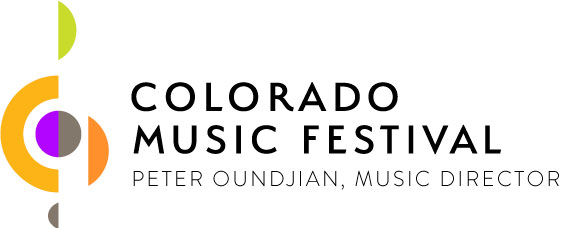story by Kyle MacMillan
photo by Eugene Yankevich
For long-term attendees of the Colorado Music Festival, Michael Christie doesn’t need much introduction. Plenty of regular attendees remember his 2000-13 tenure as Music Director, during which he broadened the Festival’s offerings, boosted its national recognition, and nearly doubled its attendance.
According to Christie, when the 48-year-old conductor stopped at the Festival a couple of summers ago on a vacation with his family, a wash of emotions came over him as he entered the doors of the Chautauqua Auditorium where he once led dozens of concerts.
“That building is a very emotional place,” he said. “It’s a place where there are a lot of associations, and even when I walked in with my kids a few years ago, it was intense to see the same ushers and many of the same musicians.”
On July 20 and 21, 2023, Christie, whom the Festival has honored with the title of Music Director Emeritus, will make his second appearance as conductor since his departure. “I’m very grateful that they have made a place for me,” he said.
For his return, the Minneapolis-based conductor will lead what he calls a “pretty unusual” program, because it features soloist Michelle Cann in two concertos on the first half – Maurice Ravel’s Piano Concerto in G major (1929-31) and Florence Price’s Piano Concerto in One Movement (1934). While the first is a well-known staple, the second is just now beginning to establish itself since the recent rediscovery of Price, a Black composer whose works were all but forgotten following her death in 1953 in large part because of her race and gender.
“I love that era, especially as we have all gotten to know more about Florence Price,” Christie said. “[Her work] makes the Ravel that much more interesting because both concertos speak to all these different influences of the time.” Ravel was experimenting with jazz, and Price was creating what Christie called a “very natural integration” of Post-Romanticism and African- American folk music. “There is nothing forced about it,” he said of Price’s stylistic fusion. “It just happens. You’re like, ‘I know that tune,’ even if you don’t know it. And [the work is] so expressive and so virtuosic for the pianist.
“So, the two concertos speak to each other in a very lovely way.”
The second half of the program centers on Piotr Ilyich Tchaikovsky’s Symphony No. 4 F Minor, Op. 36, which the ever-popular Russian composer wrote in 1877-78, about 14 years before his famed ballet, The Nutcracker. Though the movements are not titled as such, Tchaikovsky revealed the programmatic intent behind this work, which deals with the central theme of fate, in a letter to its dedicatee and commissioner, Nadezhda von Meck.
“It’s about really putting the spotlight on the orchestra,” the conductor said. “It’s about a piece of music they all know really well, and it’s a piece I know really well and seeing how we can make something special with it.”
During his time in Boulder, Christie was best known as a symphonic conductor, because he also held two other notable orchestral posts, music director of the Phoenix Symphony (2004-2013) and Brooklyn Philharmonic (2006-10).
But in the last decade or so, the bulk of Christie’s acclaim has come in the operatic world, including a 2012-18 stint as music director of the adventuresome Minnesota Opera. “I’ve really enjoyed the collaborative spirit of opera,” he said. “I like the fact that there is so many exciting things – both in a terrifying way and exhilarating way – that can happen in opera, and I like being able to look up and see a singer just take that extra breath and know that they’ve got that moment that they need and make that work.”
Although Christie leads his share of operatic staples, he has become a go-to conductor for new works. These include the world premiere of Mark Adamo’s The Gospel of Mary Magdalene at the San Francisco Opera, North American premiere of Unsuk Chin’s Alice in Wonderland at the Opera Theatre of St. Louis, and European debut of John Corigliano’s The Ghosts of Versailles at the Wexford Festival Opera in England.
No recent creation has gained him more accolades and attention than Mason Bates’ The (R)evolution of Steve Jobs, a one-act opera based on the life of the celebrated Apple co-founder. (As luck would have it, the Festival will perform a suite from Bates’ opera, titled The Rhapsody of Steve Jobs, on July 27 & 28.) Christie led the 2017 world premiere at the Santa Fe (N.M.) Opera and Grammy Award-winning recording, not to mention a series of subsequent productions at the Atlanta Opera and elsewhere.
“Ninety-six minutes,” he said of The (R)evolution of Steve Jobs, “17 scenes, great, great music and every component that we would expect in a Mozart opera, a Bellini opera, all those facets are there – arias, ensembles, interludes and big finales. People love it. It’s just so amazing to hear roaring applause and not just grateful applause.”
“It has been my mission to beat the odds, if I can, and have a foot in both worlds,” he said. “In most places, people like to say you’re either opera or symphonic conductor, but I’ve been adamant to try to say that I’m carving time for both of those worlds.”
